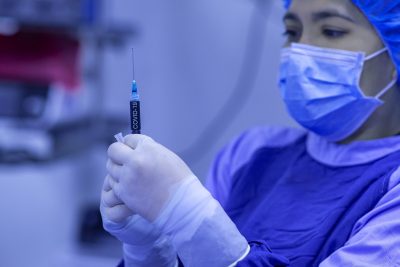Massachusetts ordered 59,475 doses of the Pfizer COVID-19 vaccine Friday, the first shipment of 300,000 total vaccines the state expects to receive from the U.S. Centers for Disease Control and Prevention by the end of December.

Gov. Charlie Baker said at a press conference held at the Worcester field hospital Thursday that while he is optimistic about the vaccine, people must remember not to relax in their adherence of public health measures.
“Progress on this does not mean, however, that we are able to flip the switch and suddenly return to normal,” Baker said.
Residents should continue to wear masks, avoid large gatherings and maintain physical distance from others, Baker said.
Katheleen Conti, assistant director of media relations for the Massachusetts Department of Public Health wrote in an email statement that the state will provide safe and equitable vaccine distribution in accordance with CDC guidance.
Distribution will be divided into three phases based on the number of doses available, according to an October draft of the Commonwealth’s COVID-19 Vaccination Plan.
Phase 1, which assumes a limited supply, would vaccinate health care employees and volunteers, other essential workers and high-risk individuals such as those aged 65 and older.
The initial allotment of 300,000 doses is meant to be the first of two doses distributed to the public.
Laura Corlin, assistant professor of public health and community medicine at Tufts University School of Medicine, said frontline medical workers should be the “first priority.” High-risk individuals should also receive the vaccine the earliest, she added.
“Massachusetts has been taking all of the appropriate steps to ensure that as soon as the vaccines have been approved and distributed to the states, that they’ll get out to the public very quickly,” Corlin said.
Paul Beninger, associate professor of public health and community medicine at TUSM, said healthy, young individuals will be among the last vaccinated.
“They’re probably the ones that are going to be in the last pool,” Beninger said. “It’s a big pool. You’re probably talking maybe a couple hundred million people.
The exact amount of time needed to reach herd immunity is uncertain, Beninger said.
“Herd immunity is really the goal,” Beninger said. “We need the population to be vaccinated at 50-60 percent to put the virus pretty much on the defensive.”
Thirty-eight percent of Massachusetts adults said they are very or somewhat unlikely to get vaccinated for COVID-19, according to a November poll by the Western New England University Polling Institute. Respondents cited concerns over the validity of the approval process and possible side effects.
Corlin said people should be “confident” a vaccine approved by the U.S. Food and Drug Administration is safe and effective.
The poll also found 42 percent of non-white respondents said they were very or somewhat likely to get vaccinated, compared to 65 percent of white respondents.
Haeok Lee, a professor in the nursing department at the University of Massachusetts Boston, said this lack of trust is one of the “fundamental problems” within the United States, especially in communities of color. However, she said, surveys have shown people in other countries would trust a vaccine more.
Having clinical trial participants of diverse backgrounds explain their experiences with the vaccine may increase public trust, Lee said.
“That way, let people [have] more trust,” Lee said, “by knowing what is the benefit, what is the weakness.”
She said politicians can also volunteer to be vaccinated first to help persuade public opinion.
Corlin said she intends to get a vaccine, too, when it becomes accessible to her.
“I will absolutely get vaccinated as soon as I can,” Corlin said. “I’ll get vaccinated with whichever vaccine is available in our area.”






















































































































